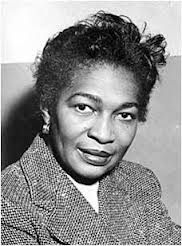

Claudia Jones
Professor Carole Boyce Davies of Cornell University has continued unearthing the life and political legacy of Claudia Vera Jones (1915-1964), a leading figure in the communist and Black Liberation movements between the 1930s and 1960s.
Following Davies’ previous work entitled “Left of Karl Marx: The Political Life of Black Communist Claudia Jones” (2008), her book “Claudia Jones: Beyond Containment” (2011) is a collection of writings by Jones herself. It reveals why Jones’ impact was so profound, from the Caribbean to the United States and finally Britain, during the period between the Great Depression and the awakening movements of the 1950s and 1960s.
Jones was born Claudia Cumberbatch in 1915 in Port-of-Spain, Trinidad, which was then a British colony. Although she came from a stable family, the economic crisis which hit the island during the 1920s prompted them to emigrate to New York City in 1922. Her mother worked in a garment factory after arriving in the U.S. and died in 1927.
A brilliant student, Jones later joined the campaign to save the lives of and free the Scottsboro Nine, who were falsely accused of raping two white women in Alabama. The young African-American men faced the death penalty, and had it not been for the efforts of the Communist Party and later the NAACP, they would have been executed.
In 1932, at the age of 17, Jones contracted tuberculosis which damaged her health and cut short her life. Nonetheless, after her involvement with the Scottsboro Nine case, she became deeply involved with left politics and joined the Young Communist League in 1936.
Jones also became active in cultural affairs through a drama group organized by the National Urban League. Later she wrote a column entitled “Claudia Comments” for a Harlem publication.
After joining the YCL, she was recruited as a staff writer for the Daily Worker, the newspaper of the Communist Party during this period. Jones became an organizer in Harlem where she engaged in mass work through the National Negro Congress and the Southern Negro Youth Congress.
Her talent and dedication led to her meteoric rise within the ranks of the party. By the early 1940s, Jones served on the National Council of the YCL, directing its educational division. She sat on the editorial board of the Weekly Review, and in 1943 she took control of Spotlight, the monthly magazine of American Youth for Democracy.
Jones was an organizer of youth, Civil Rights and religious groups as well as immigrant rights committees. In 1945, she was appointed “Negro Affairs” editor of the Daily Worker and became the youngest staff member. During the same year she was appointed to the National Negro Commission and the Communist Party’s National Committee.
In a report to the CP national convention in 1950, Jones stressed the need to “demonstrate that the economic, political and social demands of Negro women are not just ordinary demands, but special demands, flowing from special discrimination facing Negro women as women, as workers and as Negroes.”
Repression, detention, deportation
Jones’ organizing work brought her to the attention of the FBI. In searching for background information on the young activist, government agents eventually discovered that she had applied for and been denied U.S. permanent residency and citizenship.
In the aftermath of World War II, the U.S. government began an intense campaign against the left, often referred to as McCarthyism, due to infamous hearings conducted by Wisconsin Republican Senator Joseph McCarthy. Thousands of people were harassed, vilified and arrested, forcing many into seclusion, exile and deportation.
During this wave of repression Jones was arrested on immigration charges in 1948. She was held at the notorious Ellis Island detention facility while a campaign was launched that halted her deportation for a time. She was represented by George Crockett Jr., an African-American lawyer from Detroit who would later become a judge and U.S. Congress member.
Eventually in 1951, Jones was charged with violating the Smith Act, which outlawed the “advocacy” of overthrowing the U.S. government. She was indicted along with other leading communists, including Elizabeth Gurley Flynn, Simon Gerson and James E. Jackson.
Jones remained free while the case was under appeal. However, in 1955 her appeal was rejected by the U.S. Supreme Court, and Jones was sent to the women’s federal prison in Virginia where she suffered a heart attack. After a national campaign, she was released in October of that year, but was forced to leave the U.S. to live in Britain.
Her years in Britain were heavily centered on the fight against racism. Jones published the West Indian Gazette and initiated the Caribbean Carnival in London.
Jones traveled to the Soviet Union and China during the early 1960s. In later years, however, the conditions under which she lived in the U.S., where she had tuberculosis as a youth and a heart attack in prison, compromised her health.
In December 1964, Claudia Jones passed away in Britain and was buried in Highgate cemetery near Karl Marx.
Jones’ life and leadership in many struggles are becoming more well-known in the current period. Davies’ book makes a tremendous contribution to the literature on left, women’s and Pan-African struggles during the 20th century. A new generation of activists and organizers will benefit immensely from Jones’ writings on the most pressing and burning issues of the period, from which we can draw lessons for today.
As part of Workers World newspaper’s coverage marking the 50th anniversary of the liberation of…
From the PFLP Central Media Office The following statement from the Popular Front for the…
Newark, New Jersey Over 250 people, representing over 250 New Jersey endorsing community groups, attended…
Special to Workers World The following is a press release issued on April 24, 2025,…
dear Larry Krasner, we heard you sued Elon Musk over his corrupt million election giveaways…
Unions join forces against harassment and deportation of members When 200 immigrant workers – from…